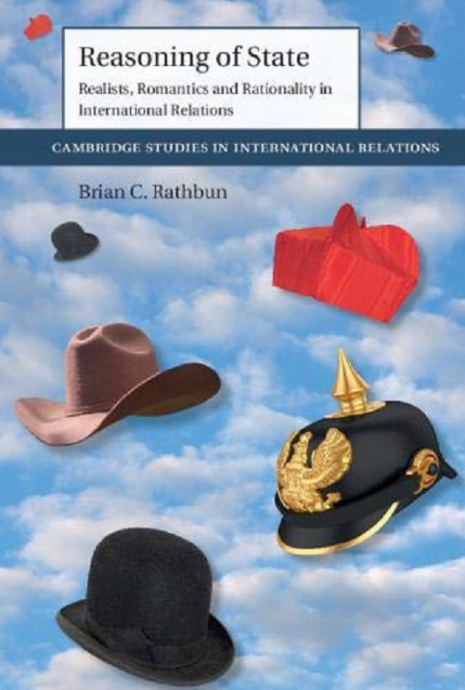What Does a Truly Rational Statesman Look Like?
At a reading of the newest installment of his friend J.R.R. Tolkien’s Lord of the Rings held by the Inklings, an Oxford book club, C.S. Lewis is reported to have complained: “Not another [expletive] elf.”
One might suppose that yet another book on realism from an IR scholar would provoke a similar reaction, but Brian C. Rathbun’s Reasoning of State: Realists, Romantics and Rationality in International Relations does not—nor is it even straightforwardly about realism.
For decades, it was a commonplace view that realism dominated scholarship in the academic field of International Relations. Realism is hardly absent from his book; but Rathbun, an IR professor at the University of Southern California, makes a compelling case that it is in many respects subordinate to the school of thought that truly dominates IR: rationalism.
The trouble, according to Rathbun, is that IR scholars lack an understanding of what rationality requires in practice, even as they blithely assume its universality. To make this case, he distinguishes between instrumental and procedural rationality. “Whereas instrumental rationality is making the best choice possible given the constraints,” he writes, “procedural rationality comprises all of those cognitive processes we associate with rational decision-making.”
To greatly oversimplify, most IR scholars of a rationalist bent emphasize instrumental rationalism over procedural rationalism. That is to say, they focus on the outcome of political events, from which a base level of rationality can be inferred. We need not know how a given individual or group arrived at a decision; it is sufficient to assume that they ultimately adopted the most efficient means to achieve their preferred ends. The intense pressures of world politics are such that those states and leaders who act otherwise are severely punished, in an almost evolutionary manner.
Mining the “Heuristics and Biases” Literature
Drawing on a growing body of literature in the field of psychology that stresses the role of heuristics and biases at all levels of thought, Rathbun contends that an instrumental rationalism divorced from procedural rationalism is a chimera. We rely upon cognitive shortcuts—heuristics—and emotion-laden, precognitive preferences—biases—far more than we rely on step-by-step reasoning. Worse, we do this even when we believe our decisions to derive from untroubled reason.[1]
Rathbun employs the “heuristics and biases” literature to frame the question: What does a truly rational statesman look like? For Rathbun, such figures are characterized not by the rote application of rational logic, but by the absence of the prejudices and biases that afflict most of us. Rather than rely upon shortcuts, they actually do the heavy cognitive lifting that rationalist scholars assume is standard operating procedure. In practice, they avoid romantic idealizations, subject their own intuitions to careful scrutiny, soberly deliberate before making important choices, and continually update their information about known political phenomena.
Of course, this sounds like a textbook description of a realist. And that’s Rathbun’s point: that rationalism properly understood is a precondition of the practice of realism.[2] This review is hardly the place to delve into the major theoretical debates about realism, but suffice it to say that realists and their critics alike have long observed that realism’s descriptive and prescriptive elements have tended to work at cross-purposes. This is why self-proclaimed realists end up both claiming that we live in a world in which states and statesmen act according to amoral self-interest, and lamenting their frequent failure to act in this way.
Rathbun pretty much cuts through this knot by arguing that realism is best understood as more prescriptive than descriptive, owing to the psychological difficulty of practicing the rationalist mandates of realism. Such successful practitioners of Realpolitik are literally exceptional.
Richelieu and Bismarck, Churchill and Reagan
To see how exceptional, he closely examines the historical record on two fairly uncontroversial choices: Cardinal Richelieu of France and Otto von Bismarck, the Iron Chancellor of the new German Empire. Each man ruthlessly pursued his designs, often in the face of significant domestic opposition. Yet if rational choice is simply a matter of acknowledging structural inputs and acting accordingly, then the choice to engage in the Thirty Years’ War irrespective of religious principles (in Richelieu’s case) or to pursue German unification (in Bismarck’s) should have been obvious to their compatriots.
As Rathbun says of the latter figure: “If there are indeed constraints of anarchy and power pushing and shoving foreign policy-makers in particular directions, rewarding them for successes and punishing them for failures, then Bismarck should not be the exception; he should be the rule.”
But where does that leave the rest of us? Rather than treat the majority of statesmen as failed rationalists, he introduces the category of the romantic. Romantics are not bad rationalists but are simply employing a different set of cognitive processes altogether—one based on intuition, creative impulse, and a strong belief in personal agency.
Rathbun balances his scheme by contrasting the archetypal realists with two successful romantic counterparts: Winston Churchill and Ronald Reagan. These are canny choices, in part because their successes could provisionally be viewed through the prism of instrumental rationalism. That is to say, each one had a clearly defined goal (respectively, the preservation of Britain’s freedom against Nazi Germany’s domination of the continental Europe, and the termination of the Cold War on American terms) that he pursued under systemic and material constraints. Yet Rathbun aims to show that this does not remotely capture how they went about considering their policy choices.
The author does somewhat elide instances of each leader’s making more conventionally coldblooded decisions, such as Churchill’s order to destroy the French navy at Mers-el-Kébir in 1940, or Reagan’s 1982 sabotage of a key Soviet pipeline. That said, the chapters on Churchill are on the whole more successful than those on Reagan. Churchill’s voluminous public and private writings lend credence to his romantic image, as do the testimonials of nearly all who knew him, whether friend or foe. With Reagan, Rathbun is persuasive that romantic appeals were a crucial element of the Great Communicator’s rhetorical approach. As to whether the 40th President can himself be called a romantic, well, he remains one of our most enigmatic public figures—a fact attested to by his closest intimates, as well as many a frustrated biographer.
Meanwhile, an interpolated chapter on laboratory experiments used to demonstrate variations in rational thinking seems to be the book’s weakest. Porting in methods from social psychology exposes one to the problems currently afflicting that discipline. Classroom experiments necessarily draw on a small and not wholly representative slice of the larger human population. Though I have no quarrel with his results, I suspect they are too slender a reed to support Rathbun’s larger transcultural, transhistorical claims about variation in individual rationality. Moreover, it is not clear that his general argument requires microfoundations in the first place, relying as it does upon inductive historical inquiry.
Context Is Crucial
The book concludes with a sensible call to IR scholars, when describing the decisionmaking of actors on the world stage, to pay more attention to the cognitive and psychological processes at work in these actors. Strategic-choice assumptions may remain applicable but are more likely to be so in the case of those individuals who more or less self-consciously adopt strategic-choice thinking. Consequently, the field’s understanding of psychological types needs to encompass a wider menagerie than a spectrum of better and worse rationalists.
One does wish that Rathbun had more fully discussed the historical context of his claims. Rationalism’s explanatory utility is notionally transhistorical, but it is striking that Rathbun’s two realists par excellence go back 130 and 380 years, respectively. They partly predate romantic nationalism but do not predate the emergence of the modern state itself.
This context is crucial for thinking about these statesmen’s goals. Neither procedural nor instrumental rationalism deals with evaluative questions concerning the reasonableness of ends. (Arguably both require a de minimis standard; a man seeking a purely fantastical goal would probably fall short on both counts, however “rationally” he went about it.) But the question is worth considering for how it impacts Rathbun’s categories. The ends toward which Reagan and Churchill worked were the best interests of their respective countries as they understood them. So far, so raison d’etat. Rathbun argues that their modes of thinking were essentially romantic, as evidenced by the oral and written record. But it is curious how the ends they sought were on the whole more prosaic than those of their supposedly more realist predecessors. Consider that Reagan and Churchill championed existing states; Richelieu and Bismarck championed states that were in different ways yet to be.[3]
Also, both Churchill and Reagan had sturdy traditions to draw upon in fashioning their romantic conservatism (and something similar might be said of Charles de Gaulle). One wants to ask whether any contemporary leader could rank with Rathbun’s realists as a successful rationalist. Singapore’s Lee Kuan Yew, perhaps? But one could as well argue that Lee was just as instrumental in creating that nation as Richelieu and Bismarck were regarding France and Germany. That is to say, he too lacked the traditional basis for a romantic politics.
Indeed, Lee also stands out for another reason: Singapore was (and largely remains) non-democratic. Both Reagan and Churchill were of a democratic age. Their thought and rhetoric were necessarily attuned to the people whose support they required. By this I do not mean that they were merely creatures of popular opinion, but that the success of their policies required popular assent (not to say popular sacrifice), in a way that was structurally not the case for prior statesmen. Richelieu and Bismarck effectively had audiences of one: respectively, Louis XIII and Wilhelm I.
This does not mean that Reagan or Churchill would have had wildly different psychological profiles had they lived in other times and places. But it does raise the question of whether democratic politics simply creates different parameters for success—rewarding leaders who can successfully marshal romantic-style rhetoric, and potentially punishing those whose style is overly cold and calculating.
Looking about the international scene today, one similarly wonders about the years to come. We find romantic nationalists and romantic post-nationalists at the helm in many countries. Whither our rationalists? Have they all abandoned politics for tech and finance?
[1] This group of theories was popularized in Daniel Kahneman’s bestseller Thinking Fast and Slow (2013), and oversimplified in Malcolm Gladwell’s even more successful 2007 book, Blink.
[2] Worth noting (even if it is a truism) is that many of the most influential and noteworthy realists made no rational-actor assumption—a list that would include E.H. Carr, Hans Morgenthau, George Kennan, Henry Kissinger, and Kenneth Waltz.
[3] The same tension can be found in no less a work of Realpolitik than Niccolo Machiavelli’s The Prince.


